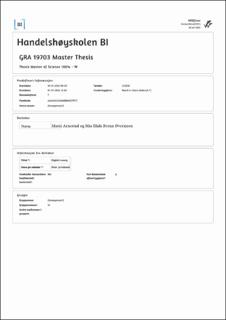Digital Luxury : Understanding the role of digital marketing for luxury brands. Is it a tool for generating sales or building brand reputation?
Abstract
The world is constantly developing in a more digital direction. As a result, the strategic choices brands make today, includes less traditional marketing (Kotler et al., 2016). However, it is argued by several experts such as Kapferer and Bastien (2015) in the field of luxury, that they are skeptical of the relationship between digitalization and luxury brands. The very core of luxury can be considered as a delicate balance between the desirable and the inaccessible - which to a large extent contradicts the seemingly increased accessibility among the population through digital advertising. The internet is a mass medium being available to the whole world, while luxury on the other hand is exclusive and rare. Thus, it may seem as if the two concepts are contradicting each other. It is argued by researchers like Dion & Arnould (2011), Hennigs et al., (2012) and Keller (2017) whether social media and digital advertising may create confusion around luxury brand attributes, such as exclusivity and uniqueness.
This study lays the foundations for investigating how digitalization affects luxury consumers´behavior as well as luxury brand identity in the digital era. Going online for luxury brands, does it lead to increased sales and customer loyalty, or could it potentially lead to cannibalization and destroy brand reputation? In addition, how or whether luxury brands can use digital marketing in relation to their identity and brand values without going at the expense of their brand image among customers. Based on this, the following research question was conducted for our master's thesis in strategic marketing management: Understanding the role of digital marketing for luxury brands. Is it a tool for generating sales or building brand reputation?
Existing knowledge and findings about the luxury market and the development of digital marketing are presented in the literature review. Further, the theoretical part highlights important theories within luxury branding, e-commerce and social media. Based on the theory, one can conclude that brand equity, brand image and brand identity are important concepts to take into consideration when it comes to luxury marketing. In addition, the shift from web 1.0 to web 3.0 was presented. The important luxury theories that underlie the theoretical background are as
iii
follows: Vigneron & Johnson´model of Brand Luxury Index, the Brand Identity Prism by Kapferer and Brand Resonance Model by Keller. In addition, new and important theories were presented by Batat such as “The shift from Web 1.0 to Web 3.0”, “Online Luxury Customer Experience” and “Digital tools used in the customer experience”.
To be able to answer our hypothesis and underlying research question, it was most suitable to use a quantitative study as it would provide a lot of data in the most effective and efficient way. The data was collected through a self-administered online survey. The survey was shared on social media and among friends and family - both men and women over 18 years. Friends and family were encouraged to share the survey among their acquaintances, which assured a wider reach of respondents. The survey was available in the period of 20th of April - 23th of May.
The analysis part consists of results and findings from the quantitative survey. The results in this study indicate that consumers' attitude towards luxury brands using digital marketing to generate sales or building brand reputation is neither extremely positive nor extremely negative. In addition, unlike previous research, there is no further evidence that the luxury brand image will be weakened once they sell online or use social media. However, there is already existing evidence of luxury brands being in an online environment. Moreover, one can draw conclusions from both theory and research that brand image and brand identity are the most important concepts within the field of luxury marketing.
There are several limitations that are identified in this study related to time and resources. Among other things, in order to be able to generalize the results to other groups and the population, the number of respondents should be larger. In addition, it would have been relevant to carry out qualitative research. In this way, the study could have gained a broader perspective. Though, the study illustrates a general understanding of customers' attitudes of the digitalization of luxury brands. This can be used in further research. However, the results indicate that further research should be conducted on whether digitization of luxury brands varies according to different product categories and brands. Nevertheless, a clear and general overview of luxury and digitization was provided - and extensive research can make use of the underlying study.
Description
Masteroppgave(MSc) in Master of Science in Strategic Marketing Management - Handelshøyskolen BI, 2022
